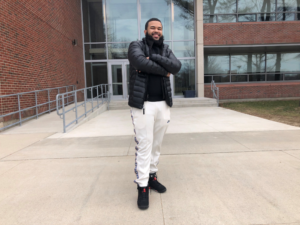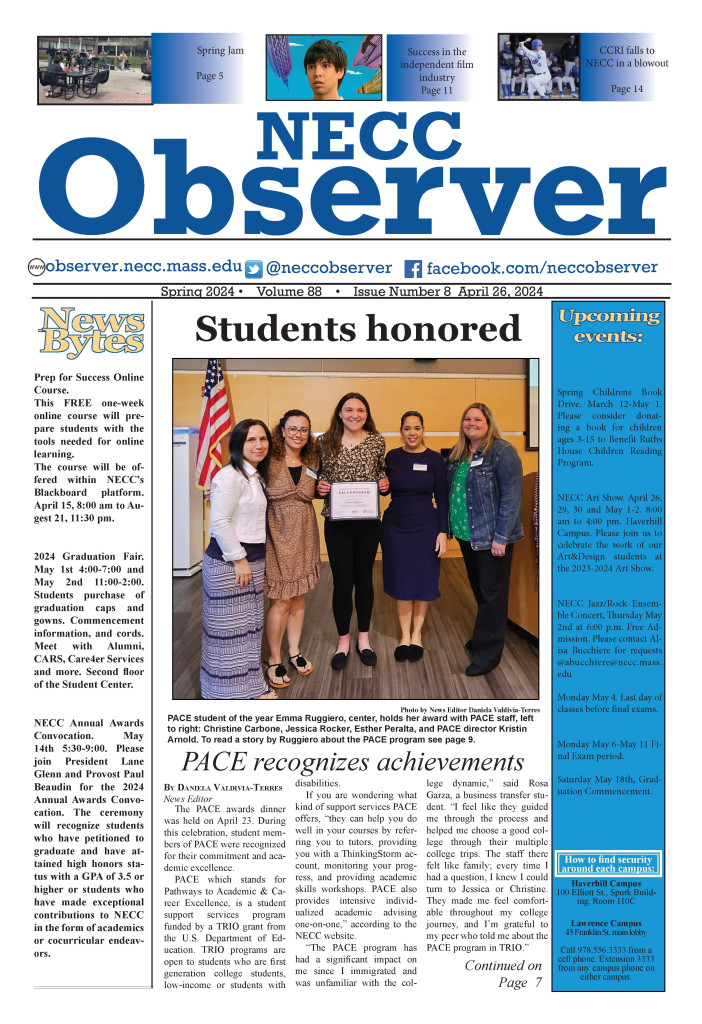Higher-ups in Northern Essex Community College’s (NECC) administration are reporting that NECC is working to establish a chief diversity officer (CDO) position, an occupation whose primary functions are planned by higher-ups to mainly consist of bridging the seeming academic success gap between white students and students of ethnic minorities, ethnically diversifying the pool of applicants for various NECC positions and evaluating, and perhaps acting on, whether or not formal messages, like letters, sent to students and faculty of color exhibit unintended racial and/or ethnic microaggressions which can deter recipients from staying at NECC.
Addressing a Thu., March 5 public meeting of NECC Student Government Association (SGA) Executive Board members (elected officials who maintain oversight over SGA affairs) and general members (unelected officials without management obligations but who can still participate in discussions and votes), NECC President Lane Glenn and NECC Executive Committee Chair Sheila Muller, both of whom accepted a speaking invitation from SGA President Samantha Cook, together laid out a case for the incorporation of a CDO into NECC’s faculty. Glenn and Muller said that the creation of the position is still in its early, planning-based stages.
While no SGA members expressed skepticism of the possible value of trying to bolster the college’s racial conscientiousness via a CDO, one student guest, an audience to the meeting’s affairs, did object that he feared anti-white discrimination could result from an effort to aid minority groups in the hiring and learning processes on campus.
Glenn and Muller both responded to the student’s remarks by saying that no discrimination against any group is intended by the college to be a part of diversifying staff and addressing the needs of students of color.
Glenn claimed that equalizing success among white and minority students has been a priority of NECC’s administration for a relatively long time: “In terms of student success, the one goal that is most important is…closing the gaps between student success, specifically between latino students and white students. We are better than most community colleges in Massachusetts at that already, but there’s still a gap. And that’s unacceptable.”
The “gap” Glenn referred to was one he said was caused by several variable discrepancies, namely differences between white and latino student retention rate and academic performance. Glenn added that a holistic analysis of overall academic performance by NECC students revealed that all these variables together constituted an approximately 6% gap between the academic success of white and latino students. He did not specify what the units for this percentage are or what party or parties conducted the analysis.
Glenn emphasized the need for administrative change by saying that NECC is, “as of 2017, what is sometimes referred to as a majority minority campus. More than half our students are students of color; that’s not the case with our employees.”
A possible solution to what Glenn deems an unhealthy lack of student ideology representation among NECC faculty is, as mentioned before, the hiring of a CDO. Glenn explained what a CDO might be tasked with by saying, “When colleges look to potentially hire a chief diversity officer, sometimes what they’re doing is trying to hire a person who will put the pressure on department chairs and deans and vice presidents and presidents, right, to be a conscience [mediator] in hiring decisions and in disagreements between students and faculty or between employees.”
He elaborated, “[We need to hire someone] to create an environment [friendly to] people who historically may be underserved or who do not have the advantages they would have if the playing field were levelled.”
Focusing more on the less general, more micro scale of a CDO’s responsibilities, Muller, speaking to the Observer, clarified what levelling the playing field could look like: “It could be, simply, a document…Say, for example, you’re getting a suspension letter. Is the wording of that letter done in such a way that a student of a particular minority group would have a better response to, would not feel threatened by?”
Words like “termination” and “suspension” often carry especially negative connotations in the minds of students of color, said Muller. She added that a CDO would screen letters sent to students and NECC employees of color in order to ensure said letters are free of microaggressions.
Discussing with the Observer the equalization of opportunities across the racial lines of prospective employees, Muller argued that the CDO should also oversee an overhaul of how the college looks for job applicants. She postulated, “When you write a description [for a job] that is so convoluted, that [the magnitude of tasks] doesn’t really match the amount of money you’re willing to pay certain individuals, it creates a certain gap due to which people are just not gonna even look at [the job]. It doesn’t allow us to have a larger pool of individuals to tap into.”
If simplification of job postings were conducted, Muller said, then perhaps NECC would begin to observe long-sought-after ideological and ethnic diversification of its faculty.
Yet the proposed position of a CDO was not without its criticism. When Glenn paused the presentation to invite questions from SGA members and guests, a student guest raised his hand to express personal concerns of his. The student said, “I’m all for diversity, but one concern for me is that I see a lot of other colleges rejecting [qualified, white] students and faculty trying to enter an organization because they’re trying to diversify their area more [with students of color not necessarily as qualified as rejected white students]…Credentials versus diversity, you know?”
Glenn, possibly referring to federal precedent set by the US Supreme Court, responded, “To be clear, quotas are illegal and wrong. We will not drive change that way. We will not drive change because of certain [demographic] numbers or percentages [in our faculty].”
He went on to specify that appointing a person of color to act as a representative of the problems of their own demographic would not only be ineffective but also racist. Glenn also, more broadly, indicated that a CDO would not be hired on the basis of their own race but by how willing they would be to help recruit people who, in some way, push the interests of “underserved” communities. Meaning, the CDO and the officials they help hire could, theoretically, be white people of racial conscientiousness. Muller, talking to the Observer, concurred with the substance of this assertion by arguing, “When you talk about diversity, it’s not just the hiring of staff whose demographics mimic [those of] the student body; [the principles must be] integrated into every fiber of our being.”
But Glenn does hold reservations of his own in regards to formally establishing a CDO position. He contended that hiring a CDO could lead to indolence among members of the NECC administration: “In my own experience, sometimes when you make [chief diversity officer] someone’s job, other people feel that it’s not their job. And, in my view, everyone should share that responsibility…there might be others that think, “Well, you know, they’ll take care of that, so I don’t have to think about it.” I want everybody to think about it.”
After Glenn said this, Muller silently nodded her head in agreement.





